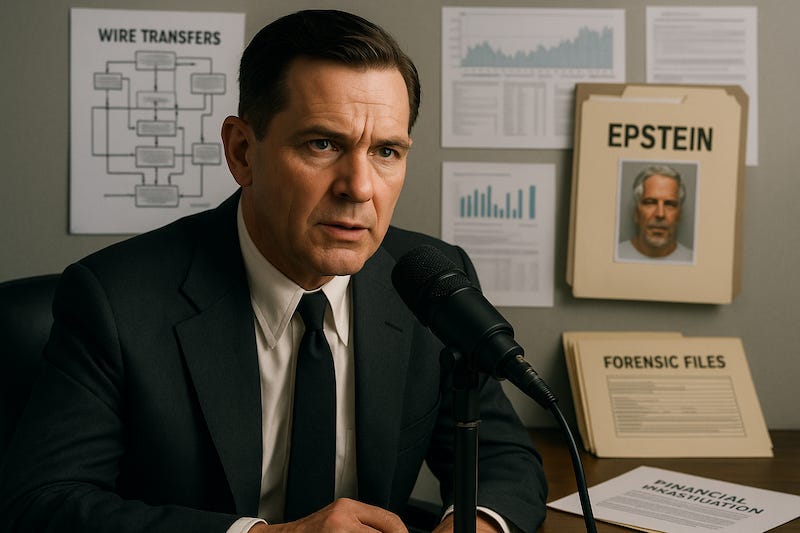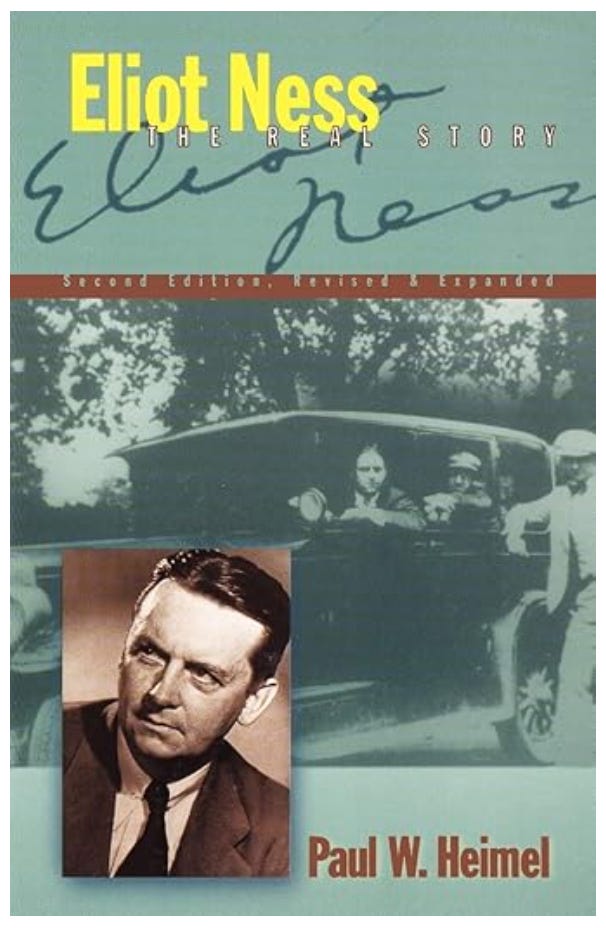Eliot Ness on Financial Crimes, Power, and the Epstein Network
Transcript reconstructed via ChronoTranscriptor™ – Chicago-Fort Meade Relay
[Host Introduction]
On today’s ChronoTalks, we sit down with a figure whose name has become synonymous with incorruptibility: Eliot Ness, the federal agent who brought down Al Capone not through violence—but through the books.
As the world continues to ask: Who funded Jeffrey Epstein? Who profited? Who was protected?—we bring back the man who proved long ago that following the money is how you bring the powerful to justice.
He’s sharp. He's furious. And he’s not pulling punches.
[Interview Begins]
Host: Mr. Ness, thank you for joining us. We want to ask you about the ongoing confusion and secrecy surrounding the Epstein case, particularly the money trail. What’s your take?
Eliot Ness: My take?
It’s the same as it was in Chicago in 1931: if you want to shut down a criminal empire, don’t start with the man—you start with the money.
This isn’t just a case of one predator. This was a network, backed by bank wires, hedge funds, shell companies, silent partners—and likely some very familiar names.
Host: Epstein handled hundreds of millions in client money—some of it from well-known institutions. Should there be a broader financial investigation?
Ness: There must be. Anything less is a farce.
When a man runs what amounts to a human trafficking empire and still manages to secure banking privileges from the world’s top financial firms—you have to ask: Who looked away? Who signed off? Who got paid?
This isn’t conspiracy. This is forensic accounting waiting to happen.
Host: What makes financial evidence so powerful?
Ness: It doesn’t lie. You can silence witnesses, shred files, threaten whistleblowers—but wire transfers leave fingerprints.
They connect buyers to brokers, brokers to fixers, and fixers to politicians.
Capone didn’t go down for murder. He went down for tax fraud. Not because it was the worst thing he did—but because it was the thing he couldn’t erase.
Host: There are sealed records, especially regarding names in Epstein’s circle. What do you say to those arguing to keep them secret?
Ness: I say this:
No man is above the law—not because he throws elegant parties or donates to campaigns.
Sealed files protect the guilty. Unsealing them protects the future victims.
The people funding this should be named, audited, and prosecuted. And if they sit in boardrooms or embassies—so be it.
Host: Some worry about institutions collapsing under scandal. That it would “shake faith.”
Ness: Faith in what? In silence? In privilege?
Real justice doesn’t threaten democracy—it preserves it.
If these institutions collapse under the weight of exposure, then they were already rotten. Better to collapse and rebuild than to let corruption rot in place under a marble seal.
Host: Would you support a federal commission to investigate Epstein’s finances?
Ness: Only if it's truly independent. No partisan strings. No corporate lawyers switching hats. Put former prosecutors, financial crime experts, and victim advocates on it—and give them full subpoena power.
Then let them run the table. Offshore accounts, donor records, property transfers—all of it.
And make their findings public.
Host: Any advice for the young investigators afraid to step on powerful toes?
Ness (leaning forward): Yes.
You’ll be offered silence disguised as caution. You’ll be warned that this “goes too high.” That you could lose your job. Your future.
I say: lose it.
Lose it all if you have to. Because the only thing worse than losing a future is living in one where predators run free and the brave stay quiet.
[Closing]
Eliot Ness taught a generation that no one is untouchable. Nearly a century later, his words ring out again—not just as warning, but as a call to action.
The truth is buried in ledgers, transfers, and balance sheets. It’s time someone started digging.
Next time on ChronoTalks: we return to 1st-century Jerusalem with an ordinary bystander who watched Christ carry the cross—before realizing the weight of what they had witnessed.
Until then—stay vigilant, and follow the trail.
This is the definitive biography of Eliot Ness—America’s original crimefighter.
Long before he was immortalized on screen by Robert Stack and Kevin Costner, Eliot Ness was a real-life lawman whose fearless pursuit of justice helped dismantle one of the most notorious criminal empires in American history. As the leader of the legendary “Untouchables,” Ness brought grit, strategy, and incorruptible resolve to the federal campaign against Al Capone, delivering a decisive blow to organized crime in Prohibition-era Chicago.
But Ness’s crusade didn’t end with Capone.
This gripping biography follows him beyond the headlines, chronicling his relentless fight against police corruption and mob violence as Cleveland’s Public Safety Director—where he restored law and order to a city on the brink of chaos. With access to new sources and firsthand accounts, the book reveals the man behind the myth: a principled reformer, a tireless investigator, and a pioneer in modern law enforcement.
You've heard the legend. Now discover the man.
This is the real story of Eliot Ness—tough, tenacious, and unshakably true to his mission. More information…




